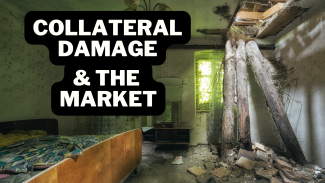
Collateral Damage
By Gary Silverman, CFP®
Imagine you own a bar. In your storeroom you have $50 worth of Russian-made vodka and $400 worth of vodka that was made outside of Russia but sounds Russian. Suddenly your patrons not only refuse to buy any of those products, some insist you pour them down the drain.
Imagine you own a gift shop that specializes in items from other countries. A perennial favorite are those wooden nesting dolls (sometimes called matryoshkas, sometimes babushkas). Because of this you ordered a box full of authentic made-in-Russia dolls for last Christmas that set you back $300. But because of Covid-related delays, they finally showed up last month.
Imagine you, as part of your investment portfolio invested 5% of your money in an exchange-traded fund (ETF) that invested in Russia a couple years back. You saw it as both a play on commodities and a diversifier to your U.S. holdings. With the closure of the Russian stock market, it’s now worth just pennies on the dollar.
These are tiny problems, unless it is your problem. There are bigger ones. When you read about a company ceasing business with Russia (even if it is supposed to be temporary), costs and lost revenues can be measured in the millions or even hundreds of millions of dollars.
All this trickles down somewhere. Less work usually means less of a need for workers. Less income usually means the company’s value goes down…as will a mutual or pension fund that invested in the company ahead of all this.
And I don’t need to tell you about the price of gas. But I will anyway. Petroleum isn’t used for just filling up your car. Trucks, trains, and ships that bring you everything will cost more to use. The equipment that plants and harvests your food will cost more to run. Have a cruise vacation coming up? Most contracts contain a provision where a fuel surcharge can be added to your bill.
Oh, and before you say that renewables will solve a lot of the fuel issues: 1) That takes years, and 2) Russia is the source for a lot of commodities that go into things like the batteries we put into electric cars and other storage devices—even the solution will be more expensive.
Seems like things can get a lot worse for us before it gets better. I’m just glad that we have the opportunity to worry about it. It’s a privilege that is not available to the people of Ukraine.
The people there forget about the trend in prices of electric vehicles when they see the wall of the apartment building across the road disintegrate in an artillery strike. The latest returns on their portfolios don’t come to mind when they help handle a hose to try and put out the fire raging through the town’s hospital. And job security is of little concern when you’ve put down your tools and picked up a rifle.
No matter how hard it gets, we’ve got it easy.
May Ukraine stay free.

